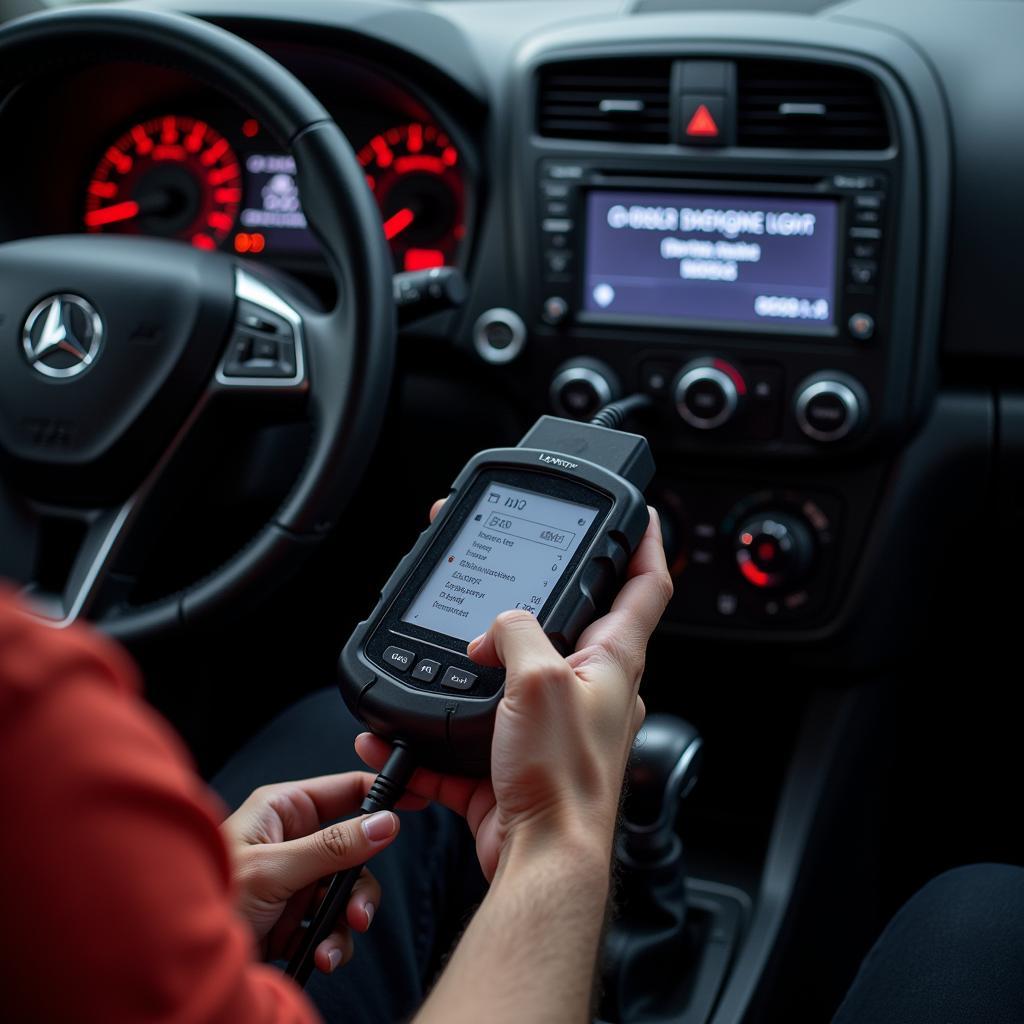A diagnostic car test, also known as a car diagnostic scan, is like a health checkup for your vehicle. It uses a specialized tool, called an OBD-II scanner, to communicate with your car’s computer system and retrieve valuable information about its health and performance. This information can help identify existing or potential problems within your car’s engine, transmission, exhaust system, and other critical components.
Why are Diagnostic Car Tests Important?
Think of your car experiencing a weird noise, a decrease in fuel efficiency, or the dreaded “check engine” light illuminating your dashboard. These are all signs that something might be amiss. Instead of playing a guessing game with your car’s health, a diagnostic car test provides concrete answers.
 Car Diagnostic Test Engine Light
Car Diagnostic Test Engine Light
By understanding the information revealed through a diagnostic car test, you can:
- Diagnose Problems Early: Identify issues before they escalate into major (and often, expensive) repairs.
- Save Money: Avoid unnecessary repairs by pinpointing the exact source of the problem.
- Improve Fuel Efficiency: Address issues that may be impacting your car’s gas mileage.
- Ensure Safety: Detect problems that could affect the safe operation of your vehicle.
- Make Informed Decisions: Gain the knowledge you need to make smart decisions about your car’s maintenance or potential repairs.
How Does a Diagnostic Car Test Work?
Your car’s computer system continuously monitors various sensors and components. When a problem is detected, it stores a Diagnostic Trouble Code (DTC) in its memory.
A diagnostic car test works by accessing these DTCs using an OBD-II scanner. The scanner retrieves the codes and translates them into readable information, revealing the nature and location of the issue.
What Does a Diagnostic Car Test Tell You?
A diagnostic car test can uncover a wide range of issues, including:
- Engine Problems: Misfires, faulty sensors, fuel system issues
- Transmission Problems: Slipping gears, rough shifting, solenoid problems
- Exhaust System Problems: Oxygen sensor malfunctions, catalytic converter issues
- Brake System Problems: ABS module issues, brake fluid level problems
- Airbag System Problems: Faulty sensors, deployment issues
- And More: A diagnostic car test can potentially detect issues in various other systems, such as the steering, suspension, and electrical systems.
Who Performs Diagnostic Car Tests?
Diagnostic car tests can be performed by:
- Mechanics: Most auto repair shops offer diagnostic car tests as a standard service.
- Dealerships: Dealerships typically have advanced diagnostic equipment specifically designed for their brand of vehicles.
- DIYers: If you’re mechanically inclined, you can purchase an OBD-II scanner and perform the test yourself. However, keep in mind that interpreting the results and performing repairs may require specialized knowledge.
You can find affordable and reliable car diagnostic services at various locations, including:
Is a Diagnostic Car Test the Same as a Code Reader?
While both diagnostic car tests and code readers use an OBD-II scanner, there’s a key difference.
- Code Reader: A basic code reader simply retrieves and displays the DTCs stored in your car’s computer.
- Diagnostic Car Test: A true diagnostic car test goes beyond just reading codes. It involves analyzing the codes, considering other symptoms, and conducting further inspections to pinpoint the root cause of the problem.
“A diagnostic car test doesn’t just tell you what’s wrong; it provides a roadmap for effective and efficient repairs,” says John Smith, Senior Automotive Technician at DiagFixPro. “It’s an essential tool for anyone who wants to stay ahead of car problems and make informed decisions about their vehicle’s maintenance.”
How Often Should You Get a Diagnostic Car Test?
While there’s no set schedule for diagnostic car tests, it’s generally recommended to get one at least once a year or whenever your car experiences any unusual symptoms.
If you’re considering buying a used car, a pre-purchase inspection that includes a diagnostic car test is crucial. This can reveal hidden problems and help you make an informed buying decision.
What are the Benefits of DIY Car Diagnostic Tests?
For car enthusiasts and those looking for a more hands-on approach, DIY car diagnostic tests offer several advantages:
- Cost Savings: Performing the test yourself eliminates the labor costs associated with professional diagnostics.
- Early Problem Detection: Regular DIY tests allow you to monitor your car’s health and potentially catch issues before they escalate.
- Increased Knowledge: Learning to use an OBD-II scanner and interpret the results empowers you with valuable car knowledge.
However, it’s essential to approach DIY diagnostics with caution. Misinterpreting codes or attempting repairs beyond your skill level could lead to further damage.
If you’re unsure about performing a DIY car diagnostic test, it’s always best to consult with a qualified mechanic. You can find resources and information on how to do a car diagnostic test on websites like DiagFixPro. They provide valuable insights and guidance on various aspects of car diagnostics, including:
Conclusion:
A diagnostic car test is a powerful tool that provides a glimpse into your car’s overall health. By understanding the importance of diagnostic car tests and the information they reveal, you can make informed decisions about your car’s maintenance, repairs, and overall well-being. Remember, a stitch in time saves nine, and a timely diagnostic car test can potentially save you from costly repairs and headaches down the road.

Leave a Reply